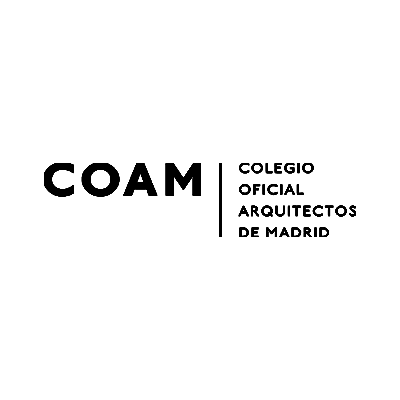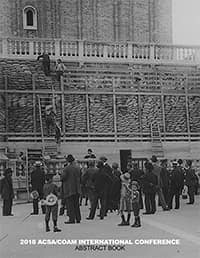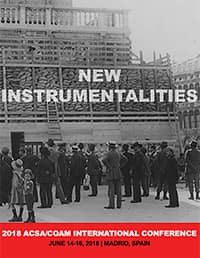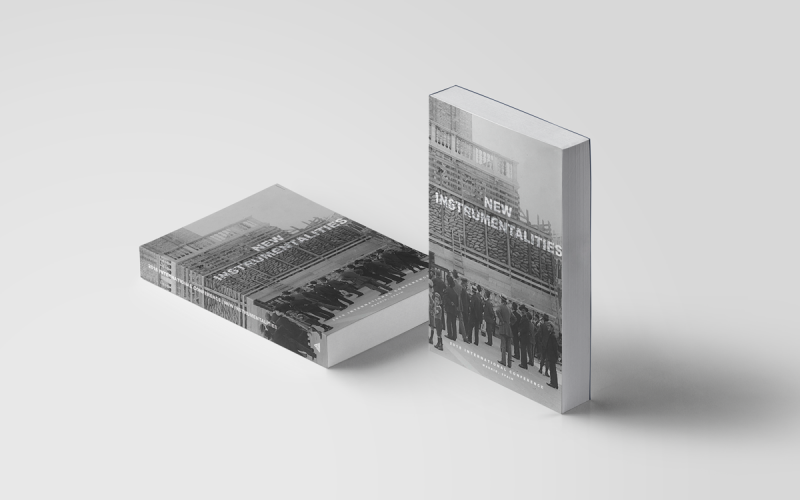
June 12-14, 2018 | Madrid, Spain
2018 ACSA/COAM International Conference
NEW INSTRUMENTALITIES
Conference Partner:
El Colegio Oficial de Arquitectos de Madrid (COAM)
Conference Co-chairs:
Iñaqui Carnicero, Columbia University
Ángela García de Paredes, Universidad Politécnica de Madrid
Julio Salcedo-Fernandez, City College of New York
Conference Overview
Join architecture and design professionals throughout the world to present, discuss and propose ways architecture faculty, designers & practitioners can help resolve the multiple crises our cities are facing.
In light of the multiple crises our cites are facing, architecture is now in a position to contribute positively to salvage and invigorate the urban realm. After a decade of recasting ourselves through cultural, technological, environmental and social engagement, we -architects- seek to deploy a newly found adroitness to address the different paradigm shifts that render our cities less just, plural, safe, entertaining, productive and environmentally proficient.
We seek to identify contributions in response to these challenges on the city:
Disruption
Topic Chairs: Shawn Rickenbacker | City College New York
Martha Thorne | IE University
“Disruptive” digital economies and their impact of the social economic fabric of cities: “Disruptive” economies are transforming our cities. Uber, Amazon, Airbnb, etc. are changing the social and economic fabric of cities often displacing the disenfranchised. An example of which were the recent citizens’ revolt against Airbnb as new tourist protocols are transforming cities and disrupting the essence of a community.
Inequality – People and Capital Flows
Topic Chairs: Neeraj Bhatia | California College of the Arts
Josep Bohigas | Barcelona Regional
Historical and emerging people and capital flows are contributing to the city as a stage for augmented inequalities. The growing global inequalities as generated by real estate speculation and migrations are finding in the city a territory to intensify rather than abate a sense of equality and community. The migration trends have recently intensify beyond the rural to urban migration to include a growing number of refugees of war.
Public Space
Topic Chairs: Frederick Bonet | Obras
Momoyo Kaijima | University of Tsukuba
The changing politics and protocols of public space. Public space in the city is being continuously contested. The most egregious of these challenges comes from the recent terrorist attacks on cities across the world. More nuance challenges and opportunities are appropriations of public space and its monuments to legitimate or question power, history, memory, gender, cultures and race. Lastly, the public space of the city has become a regional and global destination for celebration and protest amply augmenting is scope.
Environmental Crisis
Topic Chairs: Jane Hutton | University of Waterloo
Andres Mignucci | University of Puerto Rico
Comprises management of environment and resources, and the challenges of consumption and resiliency. We have enumerated multiple flanks of attacks on the city and we have yet to broached perhaps the most grave ones. As Houston floods, Miami sinks and Beijing chokes, the changes brought about by climate change and resource management are beyond palpable, already catastrophic.
Nascent material conscience
Topic Chairs: Sunil Bald | Yale University
Nader Tehrani | The Cooper Union
Nascent material conscience has emerged aiming to empower local resources, addressing the economy of means and the need for new identities. The lack of real estate in some cases and busting economies in others, have increased the need of repurposing what already exists, reinforcing strategies of adaptability, transformation and reuse, therefore rising awareness of the behaviour and evolution of architecture over time.
Open Topic
Topic Chairs: Lesley Lokko | University of Johannesburg
Juan Roldan | American University of Sharjah
Open Topic will be offered for abstracts that do not fit under one of the 5 topic sessions (above), but is consistent with the general theme of the conference, New Instrumentalities. We encourage the submission of well-crafted abstracts on topics that explore a range of issues within architectural education and practice. The selected papers will be grouped according to overarching themes that emerge from the open call.
Downloads
Purchase
Eric W. Ellis
ACSA, Director of Operations and Programs
202-785-2324
eellis@acsa-arch.org
Allison Smith
ACSA, Programs Manager
202-785-2324
asmith@acsa-arch.org

 Study Architecture
Study Architecture  ProPEL
ProPEL 


